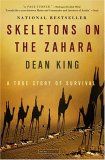Summary | Excerpt | Reading Guide | Reviews | Beyond the book | Read-Alikes | Genres & Themes | Author Bio

Solving The Mystery of a Strange and Dangerous Life
by Tom Reiss'Mixing memory with desire, this marvelous and original book once more reminds us of ways through which the imagination becomes a refuge from the uncontrollable cruelties of reality.'
Part history, part cultural biography, and part literary mystery, The Orientalist traces the life of Lev Nussimbaum, a Jew who transformed himself into a Muslim prince and became a best-selling author in Nazi Germany.
Born in 1905 to a wealthy family in the oil-boom city of Baku, at the edge of the czarist empire, Lev escaped the Russian Revolution in a camel caravan. He found refuge in Germany, where, writing under the names Essad Bey and Kurban Said, his remarkable books about Islam, desert adventures, and global revolution, became celebrated across fascist Europe. His enduring masterpiece, Ali and Nino–a story of love across ethnic and religious boundaries, published on the eve of the Holocaust–is still in print today.
But Lev's life grew wilder than his wildest stories. He married an international heiress who had no idea of his true identity–until she divorced him in a tabloid scandal. His closest friend in New York, George Sylvester Viereck–also a friend of both Freud's and Einstein's–was arrested as the leading Nazi agent in the United States. Lev was invited to be Mussolini's official biographer–until the Fascists discovered his "true" identity. Under house arrest in the Amalfi cliff town of Positano, Lev wrote his last book–discovered in a half a dozen notebooks never before read by anyone–helped by a mysterious half-German salon hostess, an Algerian weapons-smuggler, and the poet Ezra Pound.
Tom Reiss spent five years tracking down secret police records, love letters, diaries, and the deathbed notebooks. Beginning with a yearlong investigation for The New Yorker, he pursued Lev's story across ten countries and found himself caught up in encounters as dramatic and surreal, and sometimes as heartbreaking, as his subject's life. Reiss's quest for the truth buffets him from one weird character to the next: from the last heir of the Ottoman throne to a rock opera-composing baroness in an Austrian castle, to an aging starlet in a Hollywood bungalow full of cats and turtles.
As he tracks down the pieces of Lev Nussimbaum's deliberately obscured life, Reiss discovers a series of shadowy worlds–of European pan-Islamists, nihilist assassins, anti-Nazi book smugglers, Baku oil barons, Jewish Orientalists–that have also been forgotten. The result is a thoroughly unexpected picture of the twentieth century–of the origins of our ideas about race and religious self-definition, and of the roots of modern fanaticism and terrorism. Written with grace and infused with wonder, The Orientalist is an astonishing book.
Reiss takes us on an intriguing search to uncover the true identity of the author of the 1930's cult novel, Ali and Nino - Lev Nussimbaum, a Jew who became a Muslim prince, who became a bestselling author in Nazi Germany. Nussimbaum's life began in Baku, the capital of Azerbaijan, in 1905. Baku was once the oil capital of the world - a place 'where Islam and the Orient were filtered through a multicultural European lens'. When the Soviet's took over Nussimbaum and his father fled for the Persian deserts, where Nussimbaum lived the live of a nomad and converted to Islam. In the late 1920s he had become a bestselling author in Germany using the names Essad Bey and Kurban Said, until he was forced to flee for Italy, where he died in 1938...continued
Full Review
 (227 words)
(227 words)
(Reviewed by BookBrowse Review Team).
The story of Lev Nussimbaum's life starts in Baku, the capital of
Azeraijan at the turn of the 20th century.
Thanks to the joys of the internet you too can travel to Baku by browsing the local English language newspaper, the Baku Sun,
which includes a guide to the city
and even what's on the TV today. Isn't the web a wonderful thing!
Ali and
Nino (1938) and The
Girl From The Golden Horn (1939) by Said Kurban (aka Lev
Nussimbaum) are both available at Amazon. Writing as Essad Bey,
Naussimbaum is also believed to be the author of Blood and Oil in the
Orient (1929), Stalin, the Career of a Fanatic (1931), and
various other titles.
...

If you liked The Orientalist, try these:

by Wu Ming
Published 2006
Set during the height of the Cold War - with the world divided into East and West - 54 features Cary Grant as a real-life spy dealing with Italian partisans, KGB agents, Parisian lowlifes, and cameos by David Niven, Marshal Tito, and Grace Kelly.

by Dean King
Published 2005
A spectacular true odyssey through the extremes of the Sahara Desert in the early 19th century. Reader and protagonist alike are challenged into new ways of understanding culture clash, slavery and the place of Islam in the social fabric of desert-dwelling peoples.
Dictators ride to and fro on tigers from which they dare not dismount. And the tigers are getting hungry.
Click Here to find out who said this, as well as discovering other famous literary quotes!